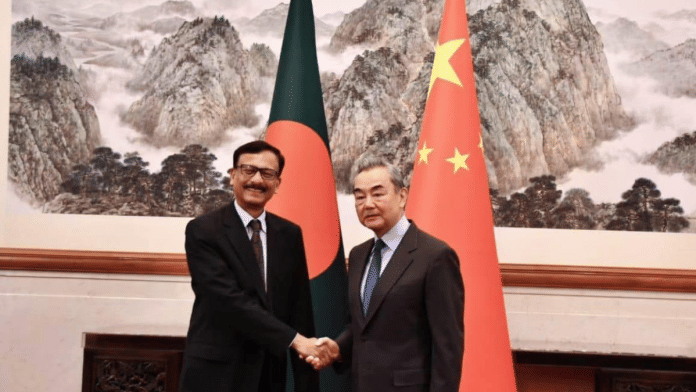New Delhi: In a move to leverage more diplomatic influence on Bangladesh, China has verbally agreed to reduce interest rates on loans and extend the repayment period to the country for its financial assistance under the Belt and Road Initiative (BRI), assuring Bangladesh that the requests will be evaluated.
Bangladesh’s Foreign Affairs Adviser Touhid Hossain held discussions with Chinese Foreign Minister Wang Yi on a range of issues, including economic cooperation and strategic partnerships, during a visit to China this week.
The trip underscores Bangladesh’s pivot towards China as it seeks to deepen economic and political ties with East Asian countries, especially since its relationship with India remains tense.
Dr Mubashar Hasan, an expert on Bangladesh politics and executive director of Sydney Policy and Analysis Centre in Australia, told ThePrint that “more China-Bangladesh engagement” is likely in the “coming months” since China has decided to support the current interim government to “further its own interests”.
“The Yunus government needs money and China has made a strategically smart move to choose to side with them, unlike India, which was a traditional ally during Hasina’s regime. While China was perhaps more financially supportive of Hasina than India during her rule, it chose to go about its business with the new government, whereas India chose to side with a fallen dictator, whose party is hugely unpopular right now,” he said.
According to a statement from Bangladesh’s Ministry of Foreign Affairs, the country has requested China to lower the interest rate on both Preferential Buyer’s Credit (PBC) and Government Concessional Loans (GCL) from 2-3 percent to 1 percent. Bangladesh also asked China to waive the commitment fee and extend the loan repayment period from 20 to 30 years.
Dr Ashikur Rahman, principal economist at Policy Research Institute of Bangladesh, told ThePrint that China is Bangladesh’s fourth-largest lender after Japan, the World Bank and the Asian Development Bank, with total loans disbursed since 1975 amounting to $7.5 billion. Of this, around $3.6 billion are allocated for five ongoing projects.
“As a result, any extension of a deadline or downward revision of interest rate will help improve debt service obligation. However, there has been no formal agreement yet—only a verbal assurance that the Chinese government will positively evaluate the request from Dhaka. On the whole, Chinese debt only accounts for less than 8 percent of overall international debt, which makes our debt situation with China very manageable,” he added.
Hossain’s four-day official visit to China is the first since the new interim government took office in August. During discussions, China reaffirmed its support for Bangladesh’s sovereignty and territorial integrity, particularly concerning the ongoing project for a mega dam on the Yarlung Tsangpo River, which flows into India as the Brahmaputra River and into Bangladesh as the Jamuna and Meghna rivers.
The two countries signed a Memorandum of Understanding (MoU) to share hydrological data on these critical water resources.
In the meeting, both sides emphasised the strategic importance of Bangladesh’s position in the region and expressed their commitment to continued collaboration under BRI. They also discussed various Chinese-funded projects, including infrastructure, energy and health care.
Bangladesh’s foreign adviser sought enhanced cooperation to ensure better access to quality healthcare for Bangladesh’s citizens. In response, China agreed to designate three to four hospitals in Kunming for the treatment of Bangladeshi patients and expressed support for establishing a Chinese hospital in Dhaka.
On the economic front, China even responded positively to Bangladesh’s requests for support in sectors like railway development, education, agriculture, water resource management, and renewable energy. Both nations reviewed ongoing projects, including the Dasherkandi Sewage Treatment Plant, the upgradation of Mongla Port and initiatives to boost digital connectivity in Bangladesh.
The two sides also discussed plans to celebrate the 50th anniversary of diplomatic relations between Bangladesh and China in the coming year.
(Edited by Tikli Basu)
Also Read: Bangladesh is becoming a security threat to India. Yunus govt is stoking anti-India politics






